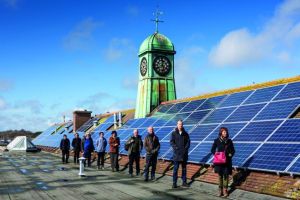Archive for “Originally posted on Transition Network” category
Showing results 86 - 90 of 383 for the category: Originally posted on Transition Network.
28 Sep 2015
The 2015 Transition Network International Conference was the first we’d run since 2012, which was at Battersea Arts Centre in London. Our home was the very beautiful Seale Hayne, near Newton Abbot, and a remarkable few days it was too. While the amazing Transition Network team, supported this year by Dan Hurring of Another World Productions, do an amazing job of putting everything in place for the conference, something magical always happens when people arrive and the conference begins. This year was no exception.
If you want a quick overview of the event, check out the Storify presentation here. The conference began on Friday with our Skills Day, with a choice of offerings including a Transition Launch training, Become Your Own Developer, Conscious Collaboration, REconomy and others. This brought an early buzz to the venue while those coming for the main conference were still making their ways there.
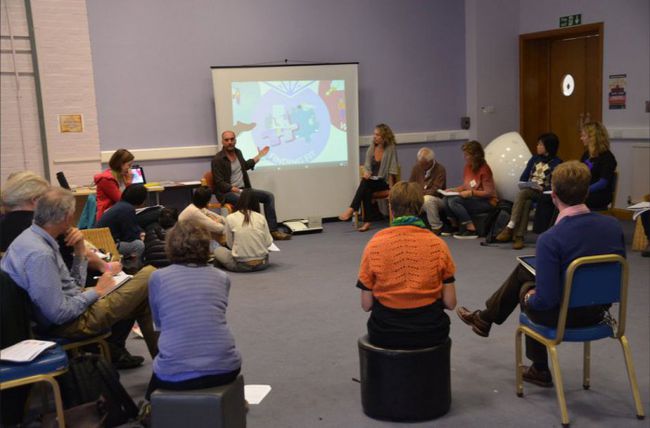
The conference itself kicked off at 6.30pm, with delegates being welcomed by local choir Glorious Chorus, first in the courtyard and then singing us all into the Great Hall. Hosted by Sophy Banks and Anna Maris, it featured a few short welcomes, including one from Juliet Davenport, CEO of Good Energy, the conference’s main sponsors, who told those gathered “we’re here to listen”, as well as from the Dame Hannah Rodgers Trust, our hosts at Seale Hayne.
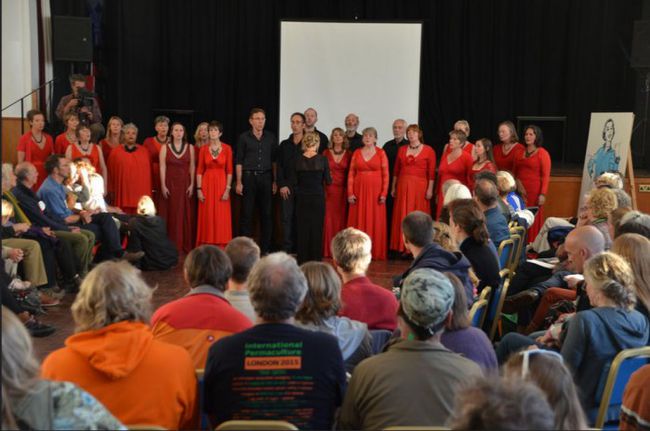
We then did our traditional mapping exercises, mapping the room from oldest to youngest, and then geographically in terms of where people had come from, and lastly the size of our settlement, and how long we had been doing Transition. People with roving mikes took soundings from different places in the room so we could all hear snippets of who we were to be spending the next few days with.
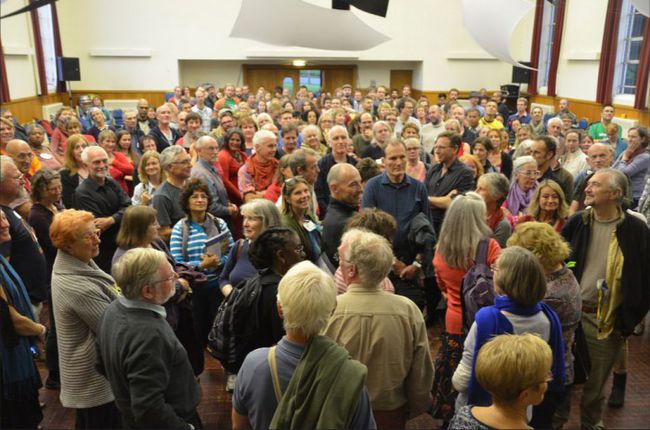
Anna from Columbia set the mood about right when she said, “I am so excited to be here … I have bubbles in my stomach!” The opening closed with Glorious Chorus, who sent people off out into the night, first to eat, and then possibly to the Bar, with a song. Saturday opened with sunshine.
For the first session, people made their way down to the Sports Hall. With the addition of people just coming for the Saturday, this was a very large group of people!
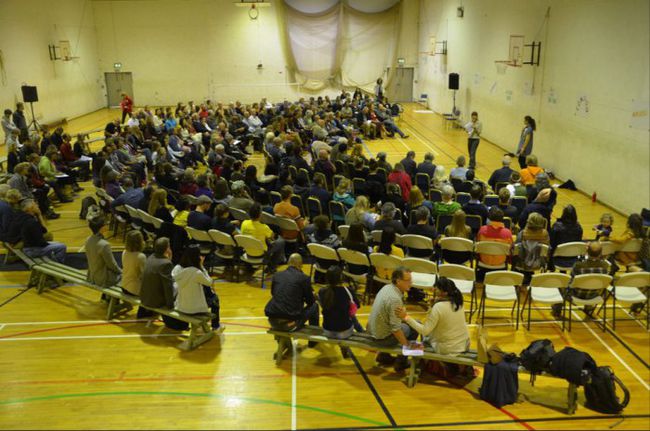
Juan del Rio from Spain and Josue Dusoulier from Belgium facilitated the activity. Working in groups, they were asked to write down what they were bringing to the conference, what they were looking for, and what they are celebrating. These were pinned up along the Hall’s long wall, arranged under each nationality.
We were then treated to the amazing site of many hundreds of chairs being carried back up to the main building by many hundreds of people.
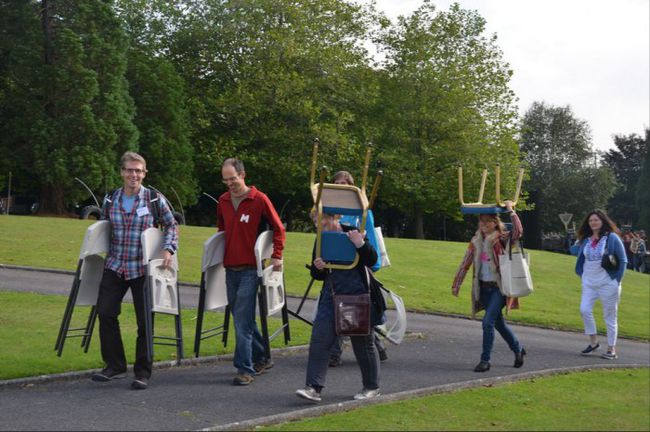
The first workshop session offered an embarrassment of riches. There were workshops on, among other things, the Transition Healthcheck, Caring Town Totnes, how does change happen, Indigenous Wisdom, conflict resolution, REconomy, Common Cause and social media, followed by lunch in the sunshine, which also featured the launch of Howard Johns’ new book , Energy Revolution.
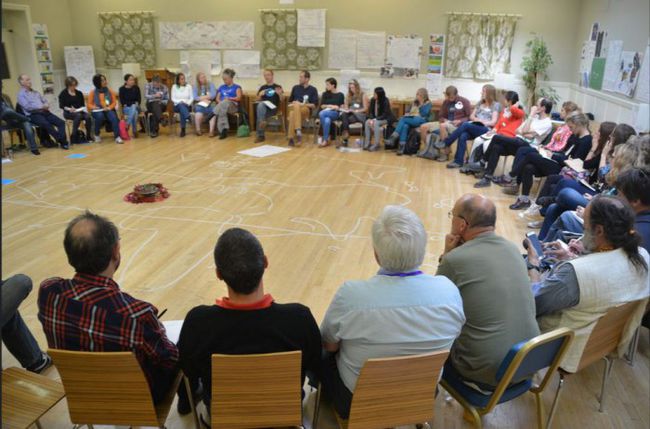
The afternoon began with another round of workshops, this time including Bike Maintenance, Flatpack Democracy, setting up a Local Entrepreneur Forum, Sociocracy 3.0, a Truth Mandala, Food Assemblies, and setting up a local currency. I co-presented one with Sarah McAdam on Telling the Transition Story, presenting the Transition Story project we have been working on for the past year. With so many great workshops on offer, choosing which to go to wasn’t easy for people!
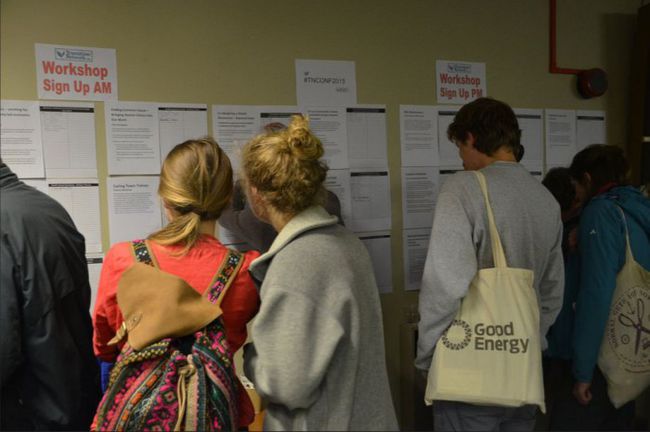
After the break, there was another, but more spacious, choice to be made. Some people headed off to sit on the grass in the sunshine, to have a sleep, or to play football. Some attended an amazing ritual, designed and facilitated by Sophy Banks called the ‘Requiem for the Industrial Growth Society’, which was widely celebrated as having been deeply moving and powerful.
Others went to the Transition Webcast, something we’ve never attempted before, but which went really well, potentially marking the beginning of Naresh Giangrande and Filipa Pimentel’s new careers as TV presenters. Move aside Jonathan Ross. Here is the video of the Webcast:
Highlights included the Australian Transition group who attended in their pyjamas (it was about 3am there) and Pella Thiel, watching from Sweden, who tweeted a photo of how she was combining watching the webcast with preparing apples for some exotic culinary purpose.
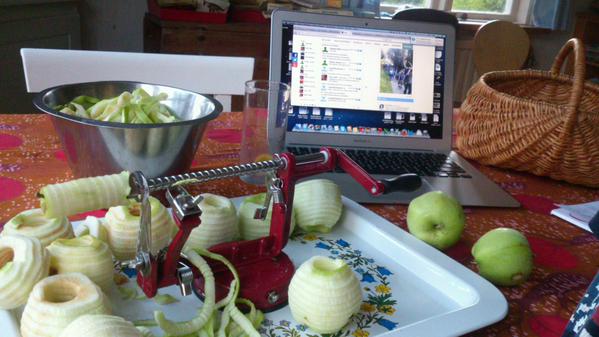
I presented a workshop that introduced the 21 Transition Stories for COP21 project I have been working on, which was very well received. Here is an audio recording of that.
This was followed by supper and then the evening cabaret! Hosted by poet performer Chris Paradox (and his amazing jacket) it featured the rather wonderful Bert Miller, a ‘Transition’s Got Talent’ spot and a disco. It also featured the opportunity to unwind, catch up with friends, and sample delicious local beers.

Sunday again opened into a glorious misty but sunny morning, and was Open Space Day. Many of you will have done Open Space, but it surely was not introduced in the way it was at this year’s conference! Presented like the briefing passengers get at the start of a plane flight, the practicalities of Open Space were outlined complete with flight attendants and announcements from the pilot.
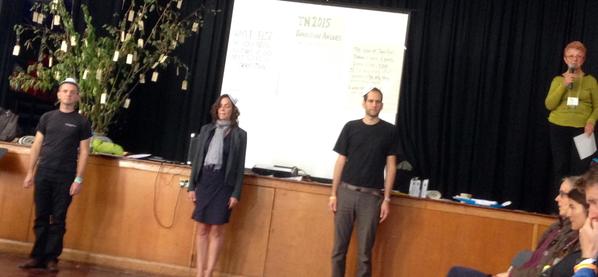
It must have worked, as everyone knew what to do and it all ran beautifully. Here is a short video capturing how the room self-organised from chaos to conversation:
There followed two sessions with a wide range of topics. You can see photos of all the write-ups from each session here. Open Space is always an amazing thing to see in practice, once again it worked a treat.
After lunch we had the closing session. Facilitated again by Sophy and Anna, it reviewed some of the key events of the previous day, and offered thanks to those who had made the event such a success, including “the Great British Weather”. We concluded with feedback from around the Hall as people shared how they had found the event.
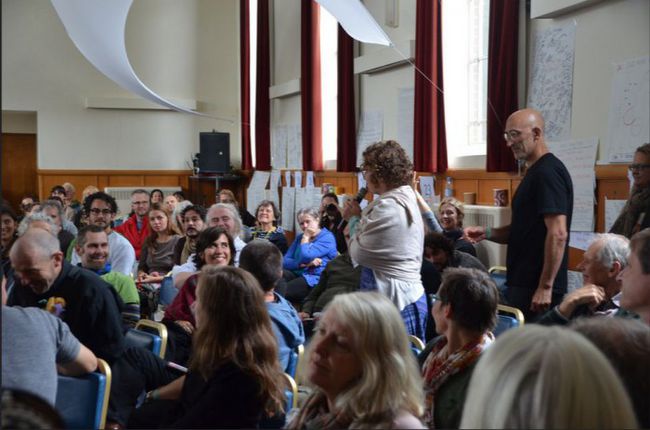
A few snippets of feedback that I noted down were:
“Transition Network has a long nose for sniffing out great things”.
“I’m a Transition Elder!”
“I think my list of Facebook friends just doubled”
“Thanks for restoring my faith in humanity”
“Solutions, solutions, solutions. I’ve not felt negative all weekend. Just positive”.
Everyone then filed out for a group photo in the sunshine, and that was that.
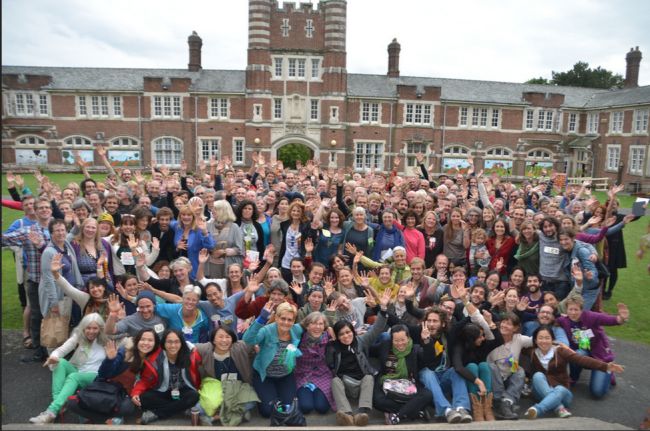
After many hugs, selfies, and exchanging of emails and phone numbers, people headed for home, apart from those who were staying on for the Hubs meeting the following day.
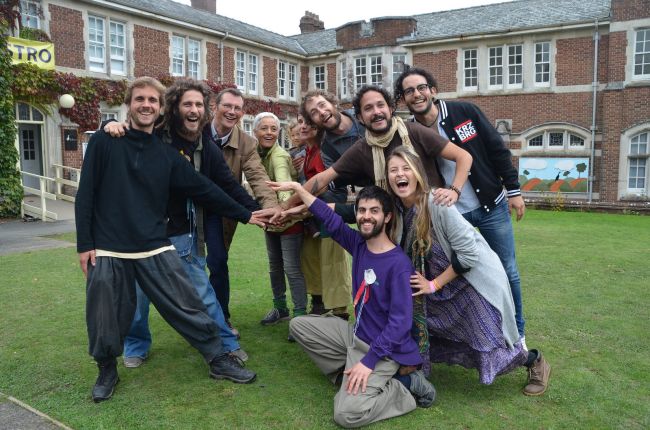
As one of just a handful of people who has been to every single Transition Network conference, what was different about this one? Firstly the international nature of it was clear, with that international feel not just represented in those attending, but also in the facilitation team. Secondly, the number of young people there was really heartening. The presence of Elders was also a feature of it, for the first time they organised Elders Breakfasts, and had a ‘Hearth’ spot where they could meet with other elders (how people chose to define themselves as ‘elders’, or not, was left up to them!)
It felt to me like the conference where the balance between Inner and Outer Transition was most seamless, most balanced, most integrated. Above all, it felt like such a privilege to be back among old and new friends, people doing such remarkable work in so many places around the world.
So, lastly, a few thanks. Thanks to everyone at Dame Hannah’s for their hospitality and welcome (special thanks to Carl Munson), to all our workshop presenters, to the technical team behind the Webcast who did such an amazing job and to everyone around the world who participated, to Bert Miller, Paradox and our Cabaret stars, to our Latin American self-entertaining singers and drummers, to our sponsors Good Energy, Triodos Bank and Naturesave, to Transition Newton Abbot and Transition Town Totnes for co-ordinating travel and couchsurfers, to the whole Transition Network team particularly Naresh Giangrande, and to Dan Hurring. It takes a community to put something like this on, and a community to bring it to life, and we are deeply grateful to you all.
Read more»
25 Sep 2015
It’s a few weeks since the Exeter Pound, which we last caught up with a few months ago, was launched. As we explore our theme of fairness, we asked Martyn Goss, one of the currency’s Directors, to share this thoughts as to how the scheme will make Exeter a fairer city:
“September 2015 saw the launch of a new community currency in Devon. From the start of the month the Exeter Pound has been tradable in just over one hundred independent businesses in and around the city. Exeter has therefore joined Bristol, Totnes and a few other places in Englandto introduce a local money system that has no value outside its own community, but which will be worth much within it.
Exonians are now able to spend their own notes (one, five, ten and twenty Exeter Pound denominations, plus a 15 EP special for the Rugby World Cup!) in registered shops, cafes, pubs, leisure venues, restaurants and elsewhere. Exeter Cathedral will accept the new money in its shop and cafeteria, as well as for admission charges. Exeter Chiefs premier rugby club is doing the same.
In the longer term, the Exeter Pound will encourage more local commercial activity, help prevent poverty and reduce environmental damage. There will be social, economic and ecological advantages, which will all be strengthened further when it goes digital in 2016.
In a global economy where smaller, family and independent businesses can really struggle to survive, a community currency provides a slightly more level playing field. As an advanced loyalty scheme, Exeter Pound offers people a chance to come alongside local companies and share a sense of stability and confidence with them. In the longer term this makes for a fairer and more sustainable society.
The Exeter Pound generates confidence and trust. We can ask the shops or cafes where we spend our money what they will do with it – ideally purchasing some of their supplies from other local firms. We cannot do this with sterling. It is too anonymous and unmanageable.
 There is no doubt that the Fairtrade movement has brought about a greater awareness of who benefits from purchasing power. My reducing the middle-takers (which is what the word ‘enterprise’ literally means) and developing more direct relationships between producer and consumer both can take advantage. My hope is that the Exeter Pound and its sister currencies will also have the same educational effect on the public. The kind of financial systems we have created direct the gains to those who are least vulnerable. Fair-trade and local money can change this and promote a just and sensitive economy where we value people and the environment more than quick monetary returns.
There is no doubt that the Fairtrade movement has brought about a greater awareness of who benefits from purchasing power. My reducing the middle-takers (which is what the word ‘enterprise’ literally means) and developing more direct relationships between producer and consumer both can take advantage. My hope is that the Exeter Pound and its sister currencies will also have the same educational effect on the public. The kind of financial systems we have created direct the gains to those who are least vulnerable. Fair-trade and local money can change this and promote a just and sensitive economy where we value people and the environment more than quick monetary returns.
The Exeter Pound is a symbol of imaginative hope and expresses a sense of fairness which the global money system does not. If I don’t like it, I could probably change a community currency. I certainly couldn’t change to Dollar or the Euro!
The deeper message of our new money is that local people can begin to make a positive impact on their city – in spite of the odds. The Exeter Pound effectively empowers local people and that is why it just and fair!
Read more»
17 Sep 2015
Richard Wilkinson is Emeritus Professor of Social Epidemiology at the University of Nottingham. He is the co-author, with Kate Pickett, of the seminal book ‘The Spirit Level’. Much of his work has focused on health inequalities and the effects of income inequality on population health. We started our conversation, given our theme this month, with the question of what, for him, is meant by the word “fairness”.
“It’s not a matter of defining it abstractly. For me, it’s looking to see what makes a difference in society, it’s an empirical question and our research has shown that large income differences between rich and poor in a society are damaging in all sorts of ways. There are a whole bunch of different ways: death rates tend to be higher, so life expectancy shortens, there seems to be more mental illness, more people in prison, higher homicide rates, poorer community life, lower levels of child wellbeing. A whole raft of things.
They have a common thread though. They are all problems that tend to be worse at the bottom end of the social ladder. It’s those kinds of problems that are worse in societies with bigger income differences between rich and poor.
The Pope recently said in his Encyclical, that economic growth is inconsistent with addressing the climate crisis. I wondered from both a fairness perspective and a climate, planetary boundaries perspective, can economic growth ever be fair?
I wouldn’t use the word ‘fair’ about it. If it uses more resources and leads to higher carbon emissions or indeed stops us reducing carbon emissions dramatically then obviously it’s very bad for the planet. We have to make perhaps 90% reductions in carbon emissions which would be very difficult with any economic growth. But of course many people will define economic growth in ways that don’t necessarily involve more resource use. So far we haven’t seen any carbon neutral economic growth.
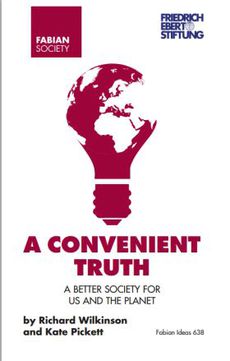 You’ve just published, or recently published a booklet called ‘A Convenient Truth’ in which you talk about and call for something called ‘economic democracy’. I wonder if you could tell us what you mean by that?
You’ve just published, or recently published a booklet called ‘A Convenient Truth’ in which you talk about and call for something called ‘economic democracy’. I wonder if you could tell us what you mean by that?
It comes up as a way of dealing with the very wide income differences in our societies. They are hugely much larger than they were for instance in the 1960s or 70s, and if you look at the 20th century you get high inequalities until around the 1930s and then they come tumbling down. Income differences go on reducing until probably some time in the late 1970s and then you get the modern widening of income differences again until our societies are as unequal now as they were in the 1920s.
Some of that is a matter of reducing top tax rates, they are hugely much lower than they used to be. But the most important component is that income differences before tax have widened dramatically. Incomes at the top have taken off and run away from the rest of us: the bonus culture, the huge incomes that CEOs and bankers and people in the financial sector have been paying themselves. What used to be true is that trade union strength was a counter to the unfettered greed of people at the top, but now unions are much weaker than they used to be and the way of recreating a democratic constraint on incomes at the top are all forms of economic democracy, by which I mean employee representatives on company boards, but also more employee owned companies, more co-operatives, things like that.
About half the member countries of the European Union have at least some legislation requiring employee representatives on company boards. That seems to make companies more efficient. It also reduces pay differences quite substantially. Britain needs that kind of legislation. We should strengthen it over time by demanding an increasing proportion of employee representatives on company boards, but we also need policies to grow the employee-owned sector and co-operatives: tax incentives, various other ways of trying to expand that sector.
Our long-term aim should be to deal with the anti-social behaviour of large, powerful, multi-national corporations which run rings round national governments and often make us all feel quite manipulated. The answer to that is democratisation. There are good studies that suggest that productivity is higher in more democratic companies and there are also indications that they perform better in environmental and ethical ways. Some people suggest that an employee buyout can turn a company from being a piece of property, the group of employees that comprise the company being owned by external shareholders, can turn that from being a piece of property into a community. It really changes working relationships when people are not working for external financial interest.

The Equality Trust (founded by Wilkinson along with Bill Kerry and The Spirit Level co-author Kate Pickett) started out quite similarly to Transition, taking a position of being very non-party political, very under the radar. But ‘The Convenient Truth’ is published with the Fabian Society. Does that represent a change in your approach?
The Equality Trust has recently become a charity and the director, I think, is very concerned to make sure he keeps absolutely to the letter the rules for being a charity. But my reason for publishing ‘A Convenient Truth’ with the Fabian Society is I thought that was the best way of getting it into the Labour Party. Fabians certainly used to be influential in the Labour Party, I suspect that’s less true now. Maybe under Corbyn it will be different.
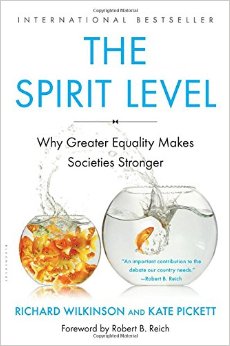 Speaking of Corbyn, one of the interesting things that’s been coming out of that is there are people in the Labour Party who have been saying that to really stress equality and fairness would make Labour unelectable, whereas he’s saying no, that’s where we need to go. I wonder if you have a sense of, if you had a government that were to adopt in full the findings of ‘The Spirit Level’ for example, would that make them more electable or less?
Speaking of Corbyn, one of the interesting things that’s been coming out of that is there are people in the Labour Party who have been saying that to really stress equality and fairness would make Labour unelectable, whereas he’s saying no, that’s where we need to go. I wonder if you have a sense of, if you had a government that were to adopt in full the findings of ‘The Spirit Level’ for example, would that make them more electable or less?
It’s very hard to predict, because we’re so influenced by the manipulative power of mass media. Some of it is owned by extremely wealthy individuals which is inconsistent with democracy. Part of any democratic constitution, I think, is that you need a well-informed public. Democracy only functions well with a well-informed public and that means having a more democratically owned and controlled media.
There is such a widespread disillusionment, anger, mistrust of politicians, more and more people not voting, saying that there’s no difference between the parties and increasing signs that people who step outside the party framework can do well. We had this in terms of mayors of London with Ken Livingstone and then Boris Johnson both seen as rather independent minded people. Clearly the following for Corbyn reflects an enthusiasm in sections of the population that haven’t been particularly interested in the Labour Party before.
There are so many things that someone like Corbyn could do. There was a suggestion in the paper that he might abolish the Party Whip which would mean, presumably, that MPs would start to say more what they believed in and became less puppets of their party views. I think people would be very attracted by that. If he handled Prime Minister’s Questions very differently it might also be very different. It might also be true that a lot of the things that he is standing for, polls suggest seem to have majority approval.
For instance, over 80% of the population seem to think that income differences are too large. That comes from the British Social Attitudes survey. He also wants to nationalise the railways. Opinion polls say there’s majority support for that. It depends very much on his willingness to speak out on these issues, really to defend them rather than be afraid of the media, afraid of the electorate, as much of the Labour Party’s leadership has been before.
In the European context we’ve seen Podemos, Syriza and other pro-equality parties doing well, but we’ve also seen the savaging of Greece by the EU and the ECB. If you want a fairer world, who should you vote for in an EU referendum?
There’s an enormous need for more international agreements. Not only to deal with climate change but also to deal with the tax havens and tax avoidance and also to deal with the enormous undemocratic power of multinationals, many of which are, in economic terms, bigger than very many countries’ national economies.
The EU, although it hasn’t often been backing the side of any of these issues that I would like, we do need those international co-operative measures to deal with these growing problems: climate change, tax avoidance and the problem of multi-nationals. I think we must be in bigger units and the problem is simply to get them to do more of the things that we need doing. We need to win them over to a more progressive agenda, if you like.
Is the message of ‘The Spirit Level’ the same in a contracting economy as it is in a growing economy?
Whichever we have and whichever phase of the business, we need small income differences. You were talking about the electability of someone like Corbyn earlier, but there is a big shift going on in world opinion. We had statements from the Pope, from Obama, from Ban Ki Moon, from Christine Lagarde, all talking about how inequality is the most important issue now in our societies, recognising how damaging it is. Even economists now at OECD and the World Bank recognising that it’s economically damaging as well.
Greater equality not only reduces issues like violence and strengthens community life, but it also is important in moving towards sustainability because one of the big drivers of consumerism which I think is perhaps the biggest obstacle to policies for reducing carbon emissions, is about status competition. The data is fairly clear now from research showing that in more unequal societies, those societies with bigger income differences, status matters more. We judge each other in those societies more by where we are in the job hierarchy and incomes and so on.
So we all get more worried about status and of course how we show what we’re worth is through our expenditure. In a way, people sometimes think of consumerism as a way of showing that you’re all-possessive, acquisitive, materialistic, but actually consumerism is a very alien form of social communication. If I wanted a bigger, better car, live in a smart part of town and wore clothes and so on with the right labels on, that’s an attempt to communicate my worth to other people. We can see in the data that those forces are stronger in more unequal societies.
You write in ‘A Convenient Truth’ that ‘we typically lived in societies with an extraordinary degree of equality.’ What went wrong?
Inequality starts to grow really from early agriculture. During the biggest part of human existence, when I say human existence I mean in our modern anatomical form with brains our current size, we lived in hunting and gathering societies which were extraordinarily equal, based on food sharing and gift exchange and so on. Not because people had a different psychology then, because any attempts at dominance and to be bossy or whatever was met by what anthropologists call ‘counter-dominant strategies’. So if you were anti-social, difficult, domineering, you would be teased, ostracised, whatever, to bring you into line. There’s a very nice book on that by Christopher Bohm called ‘Moral Origins’, well worth reading, about how those societies worked.
But although people know that agriculture coincides with or initiates the rise in inequality, there’s less agreement on what the link is and how it works. Something to do with more complicated and denser societies, denser populations. But there are other reasons as well. In a sense, agricultural production is no longer a communal activity as big game hunting was in hunting and gathering societies, so what is produced becomes a matter of individual endeavour, individual work. Of course, that’s remained true through the long history of agricultural development, so – the product is mine because it’s what I worked to grow. But in modern societies, production is a communal activity now. We all work co-operatively and all our contributions are necessary. We each produce for other people to consume, playing different roles in often very complicated productive processes. There are reasons to think that maybe economic development, industrialisation moving beyond agriculture may have changed some of the rationality of inequality, what underlies inequality.
Modern companies involve bringing together the skills of knowledgeable, highly trained people. It’s no longer a matter of an educated boss who knows what the company’s got to do and a lot of unskilled workers who are often kept in ignorance about that. The fact that modern production has that character means that you need more workplace democracy, and indeed how much control people have in the workplace seems to be one of the important determinants of workplace health.
 The focus that the Transition movement takes is starting with communities and starting at the bottom. I wonder if you had any thoughts on how Transition groups who are starting to develop new economies and start new social enterprises around food and energy and housing and all kinds of different things should be mindful of enshrining fairness and equality in from the outset.
The focus that the Transition movement takes is starting with communities and starting at the bottom. I wonder if you had any thoughts on how Transition groups who are starting to develop new economies and start new social enterprises around food and energy and housing and all kinds of different things should be mindful of enshrining fairness and equality in from the outset.
When local businesses are started it’s very important to try and start them along democratic lines, preferably as co-operatives. It’s also important to pay the Living Wage. The Living Wage is properly defined, not as the Chancellor recently defined it, and to try and keep income differences small. As I said earlier, the big rise in inequality has been runaway top incomes. Income differences in the biggest 350 or so American companies were about 1:30, 1:40 in roundabout 1980. They are now more like 300:1 or 400:1, i.e. they’re ten times as big as they used to be. Encouraging democracy in our economic activity, making sure that people on the bottom are paid adequately, and that people don’t have the power to take more than their share of incomes at the top.
It’s a while now since ‘The Spirit Level’ came out. I wonder how you regard the impact that it’s had over that time?
It’s hard to know. Clearly there has been enormous change to people’s attitudes to inequality. Our book would not have been so successful if it had come out before the financial crash and the financial crash led people to think more fundamentally about where our societies were going and where we wanted them to go. Whether we have made an important contribution to that growing concern with inequality or whether we have simply benefited from it is something we’ll never know. But we certainly know that some of the world leaders have read it from the things they’ve said, so it may well have been influential.
One of the ways in which it has been influential which is also relevant to local activity is in initiating the fairness commissions. In a number of big cities in Britain, perhaps as many as 20 of our major cities have started Fairness Commissions to try and recommend ways of reducing income differences locally. One thing they all agree on is the importance of paying the Living Wage and to reduce income differences of companies that supply the local authorities and most of those local authorities have committed themselves to paying the Living Wage. Probably tens of thousands of people are now paid a bit more than they would have been. I know that the initiative based in Islington for setting up those commissions was stimulated by ‘The Spirit Level’. I’ve spoken to them, I think almost all of them.
So we can’t really be sure what the scale of the influence is, but it’s part of a very welcome process of growing awareness.
It really is worth emphasising the connection between consumerism and inequality. That people in more unequal societies seem to work longer hours because money becomes even more important in how you show your worth, and people get into debt more: as income differences get larger, aspirational incomes grow. People feel they need more to keep up. You can see that quite clearly in the data. In a number of ways, more equal countries seem to do better in environmental terms. One of them is that because community life is stronger, people are more aware of the common good, if you like the good of humanity which is absolutely key to doing anything about the scale of the problem of climate change and carbon emissions.
One of the important effects of having closer community life in more equal societies and as a result people being more aware of the common good is that surveys of business leaders’ opinions show that in more equal countries business leaders rate national agreements on climate change as more important than business leaders in more unequal countries, where they just feel that that’s not their job, they have to look after themselves. Recycling is higher in more equal countries. So a range of things suggesting that more equal countries do better in environmental terms.
[Here is the full podcast of our conversation].
Read more»
15 Sep 2015
One of the highlights of the recent
International Permaculture Conference in London was a keynote by permaculture educator and designer
Geoff Lawton. Geoff is renowned through his website for his online videos and courses, and is perhaps best known for his greening the desert work. The second day of the conference looked at scaling up, strategies for taking permaculture to the mainstream. This was the subject of Geoff’s talk, which he has very kindly allowed me to publish in full below. In the context of our theme on fairness, his talk could be considered a meditation on what a fair food system might look like.
“Bismillahh. It is great to be here presenting in my home country, I was born Stoke-on-Trent, Staffordshire 1954, parents move to Bournemouth 1956, where went to school and grew up fishing the Stour, Avon and Hampshire Dorset coastlines, and studying the forest ecology, especially the New Forest in Hampshire and its commons. I moved to North Devon in 1974 and started surfing and winter travelling which led me to Australia in 1979 and in that first year I came across permaculture and I have become move involve every year since and now in 2015 I will be 61 this year I am pretty sure………. its a terminal infection. [Here is the video of the session in which Geoff speaks: he starts at 1:01:00].
If we looked at our planet through the eyes of an intelligent visitor from another world and assessed the earth’s biggest challenges, the most obvious would be the problems created by the human population. 99.9% activity seems to be fuelled by self interest with competitive greed, not co-operation, with exploitation of people and resources, with just a 0.1% positive patterned action facilitating productive ecosystem abundance.
Throughout our existence, the human race has been responsible for creating tremendously harmful imbalances impacting both the living and non-living systems of earth. Our planet is currently suffering unparalleled rates of species extinction and biodiversity losses. These problems are symptoms and large indications of a major evil in action. Ecosystems, on a worldwide scale, are unable to endure continuous negative human forces. Our major climactic stabilisers, are collapsing across the earth.
These life rich systems are the shock absorbers that allow points of balance to be restored after massive fluctuations in energy, such as a hurricane or some other natural catastrophe. Without them, our own existence comes into question as well. Story, ecosystems as energy storage systems, with expressions of full diversity from top predator to mass life weight diversity expressed in soil organisms, with soil creation as a consequence and indicator of energy charged capacity.
Energy being constant, as Einstein stated, as we simplify and destroy global eco-systems our climate becomes more energetic. The variations in our global climate extremes are more volatile every year, and exponentially increasing. In every region of the world we are experiencing record breaking extremes in all directions: simultaneously reaching the upper limits of one system and the barest bounds of another. The hottest, the coldest, the biggest drought, the biggest floods, the biggest winds everywhere worldwide at the same time.
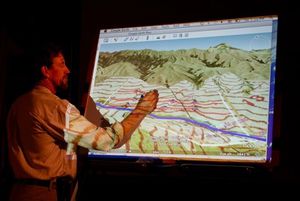
This doesn’t have to be the reality we live in, as we know the attitude, the approach, and the science which can cure all that ails us. After 25 years of designing, teaching, and consulting on every continent throughout the world, I feel the solution is very obvious. With permaculture design, we can not only impede our current negative effect, but also reverse it into a positive one with the potent potential of permaculture like an infectious global pandemic. All we have to do is hone in, and pay close attention to the natural systems.
Through our enhanced observation skills, anyone can see the very obvious cause and effect reactions in all the biological systems. Using both climatic moderation and ecosystem species richness as gauges, positive feed back loops intensify beneficial effects. These are what both people and the environment need, a massive increase in positive feedback loops. Permaculture specialises in this field, finding beneficial interactions between elements, and creating as many of these connections as possible.
The approach of permaculture design can solve all of the global challenges bearing down on our strained biosphere. Our initial action should be to stabilise our systems. Only then can we, and we absolutely without a doubt can do this, convert these systems into reliable, consistent, and permanent resources possessing true and useful value.
The problem is the solution. Every problem is a potential opportunity. It is up to us to change our perceptions.
It is up to us to allow for unlimited abundance and positivity with our vision of the emerging future we can all achieve together. First and foremost, we must engage with our current water management and access crisis. Water is essential to our life systems; we look for it on other planets because it is the chief indicator for a world’s ability to conceive and sustain complex life systems.
Personally, I have been fascinated by water all my life. I have been intensely engaged in all its aspects, from small scale harvesting systems built by hand to immense landscapes built with enormous earth moving machines. I have in-depth understanding and long-lasting expertise with aquatic dynamics and their crucial role in building life rich systems. In the extreme climates and landscapes, water is the priority in design. Clean drinking water is becoming extremely rare in the natural world and is now becoming only a manufactured product in most locations.
The World Health Organisation reports that more than 750 million people lack adequate access to clean drinking water. Diarrhoea caused by inadequate drinking water, sanitation, and hand hygiene kills an estimated 842,000 people every year globally, or approximately 2,300 people per day. Irrigation water is also in more demand all the time. Industrial agriculture is increasing the world’s dependency on irrigation technology due to its ever growing thoughtless actions without regard to the holistic integrity of natural systems.
The signs of water strain globally are the flood and drought regimes which are rising in frequency and more importantly, in high-end variability. By implementing permaculture design, and constructing productive ecosystems that are sensitive and aligned with the holistic integrity of natural systems, we can reverse this effect. To appropriately design life rich systems that harvest, pacify, and allow access to ample clean water, all while providing for our needs, is the ultimate indicator of our ability and intelligence. We have an obligation and responsibility to achieve this as an evolutionary process.
As a species, I know we’ve found the holistically designed science system capable of this feat. Permaculture is the vehicle of our evolution.
The other large-scale challenge created by industrial agriculture is soil depletion. Industrial agriculture is degrading and destroying soil fertility and physically eroding soils on a global scale at a permanent loss rate faster now than ever before in history. Soil is the core of sustainability. A sustainable system produces more energy than it consumes, and enough in surplus to maintain and replace its component parts over their lifetimes. By measuring and improving of soil quality, while creating new soil with appropriate interactions we can begin the journey towards soil abundance.
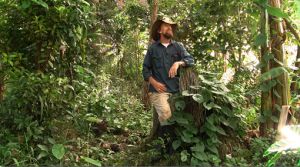
Soil is the the most complex living system in the known universe, it deserves our appreciation and respect. Agriculture in its present form does not stand the test of time. It is a very bad idea to develop and structure any system to be eternally reliant upon finite resources.
Our biggest mistake in history has been to try and provide our needs from living elements without taking the responsibility of paying serious attention to the damaging effects they have on the natural world.
Poverty is the end result of this environmental injustice. Worldwide hunger is growing and it’s not slowing down, the sad fact is … more children go hungry every day. The United Nations estimates that about 805 million people of the 7.3 billion people in the world, or one in nine, were suffering from chronic undernourishment in 2012-2014. The reason is very, very, simple. We aren’t interacting with our planet in a balanced way.
The destruction of our basic survival resources is creating a perpetual increase in global poverty. While the corporation wealth funded science and technology profit production and consumption lobby continues to promise a saviour, people are starving to death. It is not GMO, it is letting poison companies control our global food supply, it is ethical design science in action that will get us out of this mess. The definition of wealth has been manipulated, disfigured, mutilated if you will. We’ve been led astray.
We need to move the goal posts, we need to alter our aspirations. When we do this, we will all achieve true wealth by NOT only understanding, but by USING permaculture design as THE directive for positive action. We have, as a birth right, very basic requirements in life that we are all entitled to. I feel we, as an international community, we should make every possible effort to reclaim these basics in order to become truly wealthy.
The core requirements for true prosperity are;
- an abundance of clean air
- an abundance of clean water
- and an abundance of clean nutritious food.
With these fundamentals in place, we can continue on to creating an abundance of sensible passive energy designed housing with low embodied energy, thereby providing for an abundantly supportive community unified in action by permaculture ethics. This WILL create the ultimate evolution of humanity’s potential. The revolution is no longer disguised as gardening but obviously sedition and permaculture people power.
A meaningful existence fulfils us… we need to progress on from where we are… to where we want to be… this in itself is a VERY meaningful process. With the widespread adoption of permaculture design globally we will have no need for industrial agriculture in its present insensitive form. Conventional chemical as well as organic farming both lack…. sensitivity for natural patterning,….. appropriate scale,…… and beneficial positioning of interactive diversity. Industrial agriculture is inherently inefficient, obviously and inevitably unsustainable.
I have been passionately teaching people how to rapidly make soil on a small scale for many years. With specific techniques and creating local compost, it’s very feasible to design productive ecosystems to facilitate the creation of soil over large areas. Mass education is now possible so that ALL children and adults willing to learn can become completely fluent in this patterned language to a level of understanding that can be expressed in eloquence. Let’s strive towards positive solutions.
It is essential that intentional permaculture design is adopted as the core of all relevant science. With our ethics at the core as we go into action, then and only then will we engage a serious effort FOR all people. We’ll start to implement and invest in a completely global extension of true sustainability, that will repair the earth and create absolute abundance. The current crisis is actually our ultimate opportunity to evolve as a species.
We’ve been presented with the chance to learn from the transformation we HAVE to make. The path FROM the negative death and destruction economy, rooted in the production and consumption system must begin. We have a duty to the advance into the endlessly expansive economy of ecology that will produce a balanced global environment with a stable and plentiful world for all future generations. There is no limit to richness in natural living systems and the more we engage in permaculture design systems the more intricate and refined they become.
By starting with the core ethics that govern our actions, and by allowing the systems that we implement to demonstrate their evolutions… we will inevitably create a world so abundant, it will exceed the edges of our imagination. True wealth will become endlessly available to us. True wealth is achievable by design and now is the time. Our ethos of taking action is to make sure that we care for the earth, care for each other and to leave a positive legacy for future generations. A complete transformation of humanity’s action is possible.
We can grow from the most destructive species on earth, and return to our rightful position as the facilitators of the earths ecological function through permaculture design. Our common goal unifies the global community and is our true inheritance. A return to observing and learning from nature is non-negotiable, from observation, we can take those lessons and turn them into directives for action. With this ethical design framework, and its principles inspired by nature and an emphasis on low-cost solutions, we can meet our everyday needs. From Greenland to Australia, from Korea to South Africa, across the globe we can live in absolute abundance.
We can be very optimistic that this can be achieved as everything we need to know is available to us. There needs to be a global effort to redesign the systems that meet our basic needs along ecological principles, this will dramatically change our fortunes with a realistic prospect of a positive future for all. With 40 years of testing and experimentation, permaculture is ready to scale up.
Al Hamdillallah
Read more»
11 Sep 2015
While government can famously tend to be siloed, each department working in isolation from each other, at the community scale, that’s not a problem we face. Making communities more resilient is all about joining things up, making connections. As a result, we look at energy generation in a very different way to Energy Secretary Amber Rudd, for whom community energy is just a matter of generating kilowatts. Long forgotten are these words from her department’s 2014 Community Energy Strategy:
“Community-led action can produce energy, reduce energy use, manage energy demand and purchase energy. It can often tackle challenges more effectively than government alone, developing solutions to meet local needs, and involving local people. Putting communities in control of the energy they use can have wider benefits such as building stronger communities, creating local jobs, improving health and supporting local economic growth”.
There are around 5,000 community energy groups across the UK, and as well as generating what Howard Johns, author of the forthcoming book Energy Revolution calls the potential for “the wholescale transformation of the energy system”, they generate much more besides. They bring people together, create community, a sense of shared purpose, a sense of civic pride. They can create funding streams for a range of community projects that otherwise struggle for funding. Repowering London’s Energy Garden is a beautiful example of this, using solar energy to unlock new food gardens on 50 London Overground stations.
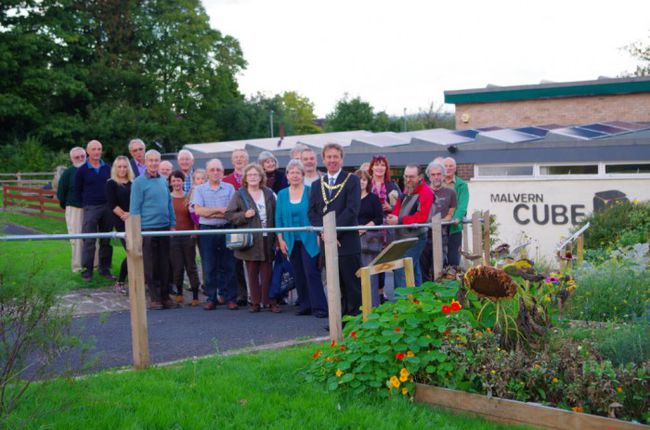
Community energy projects allow people to feel more control over what happens in their community. They create valuable partnerships of community organisations. People are able to invest in something they believe in, and they can see the world changing around them.
Community energy can also generate public health benefits. For every community-funded solar installation that Brixton Energy put in place, they also fund energy efficiency measures in the building hosting the panels, reducing fuel poverty. The World Health Organisation identify energy generation as one element of a ‘climate-friendly hospital’, the perfect way for communities to come together with local healthcare providers. Brighton & Hove Energy Services Co-operative Ltd have done amazing work in the poorest wards in Brighton working with people in fuel poverty. Getting people talking, feeling listened to, feeling part of something, all have tangible public health benefits.
According to Peter Capener of Bath & West Community Energy Co-operative, who have raised around £10 million in investment, mostly from local people, community energy “creates the conditions within which change can flourish, scale and be embedded across society”. Looking into the stories of many community energy groups, one gets a very real sense of the deeper shift from despair about the future to hope that they generate.
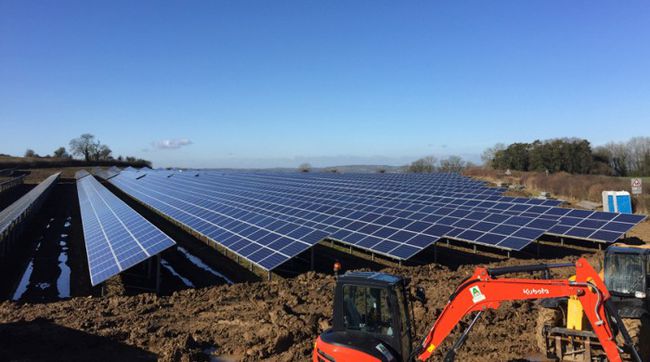
But that all now looks set to be discarded, tossed into the same waste paper basket in which the Community Energy Strategy now moulders. Rudd recently announced a review that looks set to lead to changes that could very well result in the end of community energy schemes as we know them. Having previously being quoted as saying “I want to unleash a new solar revolution”, subsidies for solar energy look likely to be slashed by up to 87% because, the thinking goes, the subsidies drive up energy bills, and so therefore need cutting. But in fact, subsidies to solar energy are tiny, only costing the average energy bill payer around £10 a year out of an average bill of £1,338. I should also mention here that, according to Oil Change International and the Overseas Development Institute, the UK government subsidise oil and gas exploration to the tune of £1.2 billion a year. And that’s in the wider context of global spending of £5.3 trillion subsidising fossil fuels, more than is spent by governments globally on healthcare.
According to Juliet Davenport, founder and CEO of Good Energy, who support many community energy projects, if Rudd’s proposals are adopted, “I think we will see a lot of these community energy projects go away, and a lot of the creativity that we’ve seen around renewables being able to be an engine for communities disappear, and that will be a real shame”. It’s more than just a shame though. It is a missed opportunity of historic proportions. Rather than the one-off payment of £100,000 the government are promising for every well fracked near on our doorsteps, the benefits of investment in community energy, generated year after year, create a self-perpetuating virtuous circle that can spin off in multiple, unimaginable and unpredictable directions.
Failing to recognise that the community energy sector is distinctly different from the commercial sector represents a spectacular failure of the imagination. Community energy is already demonstrating its potential to unlock community engagement, community investment and local economic regeneration in a dynamic way. It’s the golden thread that can run through community food projects, reskilling initiatives, local enterprise creation, public health, and so much more. If it really can’t be funded from energy bills, suggests Davenport, perhaps community energy should be supported from other budgets. For example, community renewables could be funded through local economic regeneration funding, through funds for enterprise creation, or even through public health budgets.
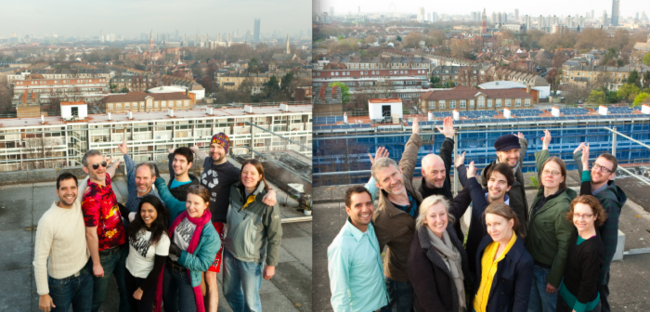
While this government has given communities the Right to Bid, the Right to Buy and the Right to Build, they are about to take away their Right to Generate. While it is motivated by concerns about the impacts on bill payers, the government appears to be missing the crucial point that the impacts of climate change will be far worse than £10 a year on energy bills. Indeed, in the context of community energy, £10 a week for the kinds of benefits it can bring about starts to look like a bargain.
Chris Rowland of Ouse Valley Energy Services Company in Lewes, told me of a government-funded peer-mentoring scheme it ran for 10 neighbouring communities. One, Hassocks, Hurstpierpoint, Keymer and Ditchling Transition, started ‘HKD Energy’. They installed 307 solar panels on a local school funded by £100,500 in shares from local people, with 83% of the investors living within a 4 mile radius of the school. Filled with confidence and enthusiasm, and the sheer buzz that comes from enabling your community to do something so remarkable, they were actively looking for new sites, new buildings, for future projects. Now, like thousands of other community groups, that passion, that commitment, that spirit, risks being brushed aside, all that dynamism dissipated.
Community energy will no doubt adapt, find different models, continue to be creative and inventive. But this is an entirely unnecessary body blow. In December, David Cameron heads to COP21 in Paris, credibility in tatters. Yet applying some creativity and a healthy dose of silo-busting, this government might see that community energy offers a remarkable opportunity to deliver much of what it wants to see: entrepreneurship; local empowerment; economic self-reliance; public health; training, apprenticeships and much more. Community energy represents an opportunity too good to miss. I’ll leave the last word to Brixton Energy’s Agamemnon Otero, who once told me:
“We’re not wedded to solar panels, or Combined Heat and Power, or whatever. We’re wedded to wellbeing. The only way people actually ever believe in themselves and get involved is when they’re allowed to be involved. As soon as you take responsibility for something and you give and you take back and you give and you take back, you develop self will and self belief, and that’s what’s been taken away from people. Again and again I see that the best way to get people involved is to allow them to take back part of their own autonomy. It’s like you distil a sourdough culture into the people and then they rise! Power to for and by the people”.
What can you do about this? You could write to your MP, sign the 38 Degrees petition, or share your thoughts, and make some of the above points, at DECC’s Feed-In Tarriff review consultation page, or sign their petition, where 100,000 signatories triggers a government response.
Rob Hopkins
Read more»
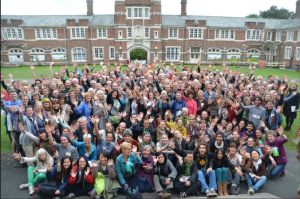














 There is no doubt that the Fairtrade movement has brought about a greater awareness of who benefits from purchasing power. My reducing the middle-takers (which is what the word ‘enterprise’ literally means) and developing more direct relationships between producer and consumer both can take advantage. My hope is that the Exeter Pound and its sister currencies will also have the same educational effect on the public. The kind of financial systems we have created direct the gains to those who are least vulnerable. Fair-trade and local money can change this and promote a just and sensitive economy where we value people and the environment more than quick monetary returns.
There is no doubt that the Fairtrade movement has brought about a greater awareness of who benefits from purchasing power. My reducing the middle-takers (which is what the word ‘enterprise’ literally means) and developing more direct relationships between producer and consumer both can take advantage. My hope is that the Exeter Pound and its sister currencies will also have the same educational effect on the public. The kind of financial systems we have created direct the gains to those who are least vulnerable. Fair-trade and local money can change this and promote a just and sensitive economy where we value people and the environment more than quick monetary returns. 


 Speaking of Corbyn, one of the interesting things that’s been coming out of that is there are people in the Labour Party who have been saying that to really stress equality and fairness would make Labour unelectable, whereas he’s saying no, that’s where we need to go. I wonder if you have a sense of, if you had a government that were to adopt in full the findings of ‘The Spirit Level’ for example, would that make them more electable or less?
Speaking of Corbyn, one of the interesting things that’s been coming out of that is there are people in the Labour Party who have been saying that to really stress equality and fairness would make Labour unelectable, whereas he’s saying no, that’s where we need to go. I wonder if you have a sense of, if you had a government that were to adopt in full the findings of ‘The Spirit Level’ for example, would that make them more electable or less?
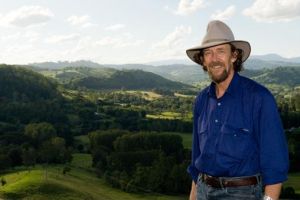

 Soil is the the most complex living system in the known universe, it deserves our appreciation and respect. Agriculture in its present form does not stand the test of time. It is a very bad idea to develop and structure any system to be eternally reliant upon finite resources.
Soil is the the most complex living system in the known universe, it deserves our appreciation and respect. Agriculture in its present form does not stand the test of time. It is a very bad idea to develop and structure any system to be eternally reliant upon finite resources. 